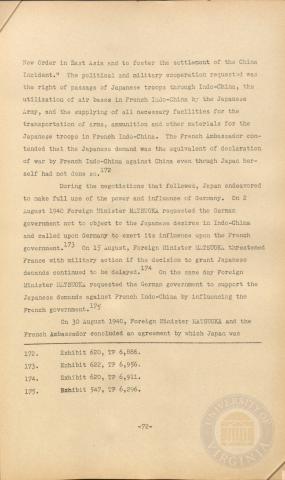
Page 72
| Parent | Japanese - German - Italian Collaboration |
|---|---|
| Date | |
| Language | English |
| Collection | Tavenner Papers & IMTFE Official Records |
| Box | Box 14 |
| Folder | Japan, Germany, Italy Collaboration and Introduction |
| Repository | University of Virginia Law Library |
New Order in East Asia and to foster the settlement of the China Incident." The political and military cooperation requested was the right of passage of Japanese troops through Indo-China, the utilization of air bases in French Indo-China by the Japanese Army, and the supplying of all necessary facilities for the transportation of arms, ammunition and other materials for the Japanese troops in French Indo-China. The French Ambassador con¬tended that the Japanese demand was the equivalent of declaration
of war by French Indo-China against China even though Japan her-self had not done so. 172
During the negotiations that followed, Japan endeavored
to make full use of the power and influence of Germany. On 2
August 1940 Foreign Minister MATSUOKA requested the German
government not to object to the Japanese desires in Indo-China
and called upon Germany to exert its influence upon the French
government. 173 On 15 August, Foreign Minister MATSUOKA threatened
France with military action if the decision to grant Japanese demands continued to be delayed. 174 On the same day Foreign Minister MATSUOKA requested the German government to support the Japanese demands against French Indo-China by influencing the French government. 175
On 30 August 1940, Foreign Minister MATSUOKA and the French Ambassador concluded an agreement by which Japan was
172. Exhibit 620, TP 6,886
173. Exhibit 622, TP 6,956
174. Exhibit 620, TP 6,911
175. Exhibit 547, TP 6,296
